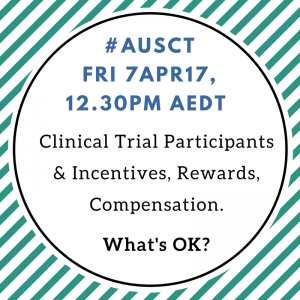#AusCT 7Apr17: Clinical Trial Participants & Incentives, Rewards, Compensation. What Is OK ?
In the wrap up of the last #AusCT chat, I suggested this chat would focus on Incentives and Conflicts of Interest in clinical trials. As I started to prepare for it however, I decided it was more than we could cover in an hour and have therefore decided to narrow the focus to the title of this post.
I have been interested for some time at looking at whether there was an ethically acceptable method for acknowledging the effort required by people who participate in clinical trials, or provide their input on trial design, conduct, materials etc as consumer representatives in research, with more than reimbursement for travel/meal expenses and/or a handshake thankyou.
We expect trial ‘volunteers’ to actually do a lot, altruistically, for the benefit of future patients, somewhat forgetting the personal costs they may have in doing so. This fails to recognise that sometimes we all need a little something to push us to get involved, and stay involved in anything for the long haul in light of competing personal, family and work priorities, or just being tired. Given that people may also be dealing with health issues on top of everything, it is to me no surprise that altruism doesn’t always get us over the line when it comes to finding/keeping consumer reps in research, and recruiting to/retaining people in clinical trials.
 I had come to the thought that perhaps a little incentive or reward to get/keep people motivated and to say thanks, would just be a nice human thing to do. After all, everyone else outside of the patients are usually paid for the effort they contribute to trials. We wouldn’t say to a researcher that “the knowledge you are helping create is going to help future researchers or physicians, so you should do it all for free”? Though some do actually spend a lot of their personal time working on trials, that is their choice, driven by their own passion. There is not the same expectation however that they should ONLY work for free, like there is of most patients.
I had come to the thought that perhaps a little incentive or reward to get/keep people motivated and to say thanks, would just be a nice human thing to do. After all, everyone else outside of the patients are usually paid for the effort they contribute to trials. We wouldn’t say to a researcher that “the knowledge you are helping create is going to help future researchers or physicians, so you should do it all for free”? Though some do actually spend a lot of their personal time working on trials, that is their choice, driven by their own passion. There is not the same expectation however that they should ONLY work for free, like there is of most patients.
In Phase 1 trials involving healthy volunteers, it is accepted that a payment can be made to recognise the time involved in the trial because the potential benefit to themselves is zero. That payment should be low enough that it does not encourage the vulnerable to take unacceptable risks just for the money. Funnily enough however, it is broadly known that uni students and backpackers constitute a large proportion of the people that participate in healthy volunteer studies, so one might question to what extent their availability drives that population skew, or the payment on offer.
For all other types of trials, there is a widely held belief that incentives, rewards, payments, etc outside of travel/meal reimbursements for trial participants are generally off the table as it is ethically unacceptable. But are they?
If you have some time (and you will need it for this) I’d invite you to read this great, though exhausting article on Incentives in Medical Research sent to me by our last guest moderator @GentgallMelanie: Ethics in Human Subjects:Do Incentives Matter? RW Grant and J Sugarman, J Medicine Philosophy 2005 29(6):717-738.
Upon reading this article, I discovered to begin with that I apparently have a pretty poor grasp on the English language. The nuances in meaning behind the words incentive, reward, compensation, reimbursement I found tough to get my head around. I thought, if I am finding it tough, no wonder human research ethics committees might find it difficult to pull apart the influence of any gift/payment/reward/etc on offer to the trial participants, and therefore take a blanket approach of NO to all such offerings.
That got me thinking….. 
Is this the best way forward, and how respected does it make our trial participants and partners feel?
Do all ethics committees say no? What has been approved before?
What constitutes an incentive, reward, compensation and how do they differ?
What are the ethical issues that need to be considered?
How do you evaluate how much is acceptable, and when?
Is our attitude/practice in Australia different to what happens overseas?
What do consumer reps to research/trial participants think is reasonable to expect for their effort?
Is there a difference between providing a direct financial payment/reward/incentive vs other types of incentives?
What incentives/rewards do we use now that are less obvious (eg offer of access to leading medical specialists, no wait for appointments)?
These questions provide a flavour of what we will explore in the next #AusCT chat, Fri 7 Apr 17, 12.30pm AEST. I look forward to a lively debate with a diversity of opinions from ethicists, researchers, consumers, health, industry on this topic.




Sorry, the comment form is closed at this time.